(Was this message forwarded to you? Sign up to receive quarterly updates from the HNP Collective!) The Health Not Prisons Collective is an intersectional national initiative launched in 2020 by Counter Narrative Project (CNP), Positive Women’s Network – USA (PWN), Sero Project, Transgender Law Center (TLC), and the U.S. Caucus of People Living with HIV (the HIV Caucus) — longtime collaborators led by, and accountable to, communities most affected by HIV criminalization in the United States. The Health Not Prisons Dispatch is a quarterly bulletin highlighting recent developments relevant to criminalization and policing of people living with HIV in the United States, along with upcoming events, relevant resources, and opportunities to get involved. HNP prioritizes authentic engagement, activation, training, and leadership rooted in our principles and deep investment in our communities. To that end, we want to hear from you! For more information about the coalition, ways to get involved, or efforts you would like to see the Collective support, email Elena Ferguson at hnp@pwn-usa.org. |
The Health Not Prions Collective (HNP) and Positive Women’s Network-USA (PWN) collaborated on a compelling statement in response to the Supreme Court’s final decision in Dobbs vs. Jackson Women’s Health Organization, which overturned Roe vs. Wade and decimated the constitutional right to an abortion. One call to action was for folks to take PWN’s pledge to protect abortion freedom. Will you? |
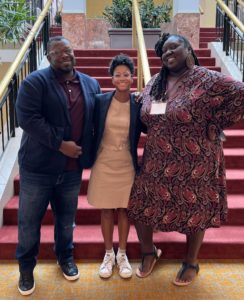 HNP takes St. Louis! In July, Elena Ferguson, PWN Policy Specialist and Coordinator of the HNP Collective represented HNP on a panel entitled “Black Movement Lawyering & HIV Justice” at Law For Black Lives’ Lawyering for Liberation Conference in St. Louis. Alongside her fellow panelists, Eric Paulk, Deputy Director of Georgia Equality, and S. Mandisa Moore O’Neal, incoming Executive Director of The Center for HIV Law & Policy, Elena discussed the important role of Black movement lawyers in HIV advocacy and envisioning radical strategies for litigation and policy advocacy with movement lawyers, law students, and organizers. HNP takes St. Louis! In July, Elena Ferguson, PWN Policy Specialist and Coordinator of the HNP Collective represented HNP on a panel entitled “Black Movement Lawyering & HIV Justice” at Law For Black Lives’ Lawyering for Liberation Conference in St. Louis. Alongside her fellow panelists, Eric Paulk, Deputy Director of Georgia Equality, and S. Mandisa Moore O’Neal, incoming Executive Director of The Center for HIV Law & Policy, Elena discussed the important role of Black movement lawyers in HIV advocacy and envisioning radical strategies for litigation and policy advocacy with movement lawyers, law students, and organizers.
|
To round-out this summer, HNP will be hosting and co-hosting several webinars in August on a variety of timely and relevant topics. Please register! |
Hands off My Black Body:
Decriminalizing HIV and Abortion |
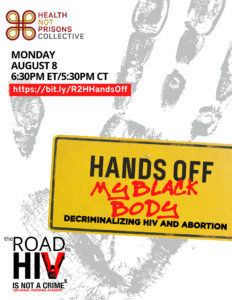 August 8 August 8
6:30PM ET/ 5:30PM CT/ 3:30PM PT As a part of the Road to HINAC 5 Webinar series, HNP will host this webinar, which will focus on the policing of Black bodies in relation to HIV and abortion criminalization. Reproductive justice advocates will discuss how both forms of criminalization are racial and gender justice issues uniquely impacting BIPOC and LGBTQ+ communities. |
Tennessee Blues:
Exploring HIV Criminalization in TN |
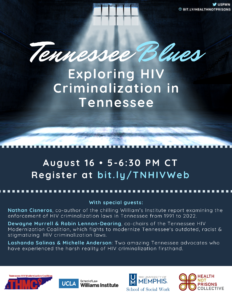 August 16 August 16
6PM ET / 5PM CT/ 3PM PT In anticipation of Southern HIV/AIDS Awareness day, this webinar will explore the disparate impact that HIV criminalization has on Black women in Tennessee. |
Ready, Set, REPEAL:
Demand Action on the REPEAL HIV Discrimination Act |
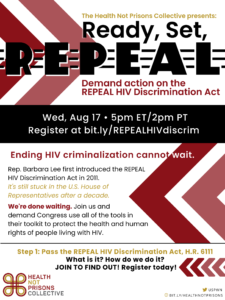 August 17 August 17
5PM ET / 4PM CT/ 2PM PT This is a must see event for anyone who cares about ending HIV criminalization in the U.S.. Congress needs to use all of the tools in its toolkit to support the health and wellbeing of people living with HIV, and that includes passing the REPEAL HIV Discrimination Act of 2022, H.R. 6111. Along with a panel discussion, HNP will introduce 1) a brand new toolkit that advocates can use to demand that the U.S. House of Representatives pass the Repeal HIV Discrimination Act and 2) an upcoming day of action planned for September 2022. |
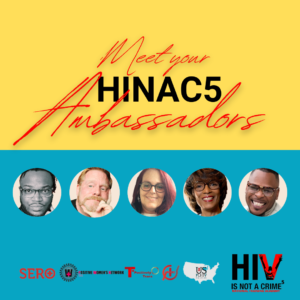 |
The Sero Project and partners are getting ready to launch the HIV is Not a Crime (HINAC) V Training Academy, which will take place in Virginia next summer (June 4-7, 2023). There will be a number of activities and announcements in the lead up to the conference. On July 12, Sero officially unveiled its HINAC V Ambassadors. These ambassadors will use their social media prowess to keep everyone updated as we get closer to HINAC. Get more information on HINAC V and its ambassadors here. |
PWN & Sero will co-host the next webinar in the White Folks Dismantling Racism in HIV Spaces series. August’s webinar will take place on August 18, 4-7:30 ET/ 3-6:30 CT/ 2-5:30 PT. Participants will discuss how we move beyond old messages and false choices (for example either/or choices) to centering racial justice and actions that support people of color in their advocacy. In the wake of the Dobbs decision (mentioned above), PWN Co-Executive Director, Naina Khanna, authored a powerful piece urging those within the HIV justice movement to join in the fight against reproductive oppression and to come out publicly in support of abortion access. If you want to learn more about how reproductive justice fits into the HIV justice movement, register for PWN’s upcoming Reproductive Justice Teach-In, which will take place September 9, 4pm ET/ 3pm CT/ 1pm PT.
Khanna also recently spoke at the 2022 International AIDS Conference in Montreal, Canada. In “Big data and AI: An ethical and human rights-based HIV response,” Khanna and her fellow panelists addressed potential opportunities for, and risks or challenges associated with, the deployment of artificial intelligence, big data, bioinformatics and data sharing in supporting and promoting an ethical and human rights-based approach to HIV prevention, treatment and care. |
Tordoff et. al. recently published their working paper on Molecular HIV Surveillance (MHS) research in King County, Washington. The authors concluded that “the potential harms of publishing our study–including perpetuating racialized stigma about/among MSM and eroding the trust between phylogenetics researchers and communities of PLHIV–outweighed the potential benefits.” PWN, U.S. PLHIV Caucus, and the Transgender Law Center co-hosted a fireside chat with the authors of the paper in July. Check out the recording here.
HNP is launching a brand new campaign to urge the U.S. House to pass the REPEAL HIV Discrimination Act, H.R. 6111, sponsored by Congresswoman Barbara Lee. The REPEAL Act calls for the assessment of and changes to federal laws that target people living with HIV for behavior that is otherwise legal or poses no risk of transmission of HIV. It also creates support and guidelines for states to reform their similarly discriminatory criminal and civil commitment laws. The REPEAL HIV Discrimination Act is an important first step in decriminalizing HIV. Stay tuned for an accompanying toolkit for advocates as well as a Day of Action planned for late September 2022. |
Decriminalization Efforts at the State Level |
In May, Governor Kemp signed SB 164 into law, making Georgia the 10th state to modernize its HIV criminalization law. This is an amazing achievement and the product of seven years of long, sustained struggle. A special shout-out to HNP partner organization, Counter Narrative Project, as well as the other advocates who participated in the modernization campaign. Read HNP’s statement recognizing Georgia’s modernization here. In Indiana, House Speaker Tom Huston assigned the Interim Study Committee on Corrections and Criminal Code to review the laws governing HIV. The review will include “provisions related to biting, spitting, donating organs and donating blood.” This specific review is significant because 1) these kinds of actions pose no risk of HIV transmission and 2) it is a first step towards modernizing the state’s outdated and stigmatizing HIV criminalization laws. To learn more, check out Brett Stover’s article in The Journal Gazette.
At the end of June, UCLA School of Law’s Williams Institute released a groundbreaking report on the enforcement of HIV criminalization in Tennessee. The findings were unsettling. Over three-quarters of all HIV registrants on the sex offender registry are Black and Shelby County, home of Memphis, Tennessee, accounts for most of the state’s HIV convictions. To learn more, check out the report and an op-ed by co-authors of the report Nathan Cisneros and Robin Lennon-Dearing. Also if you want to become more engaged with the work in Tennessee around HIV criminalization, be sure to register for the upcoming webinar that HNP is co-hosting and sign up to join monthly calls with the Tennessee HIV Modernization Coalition. |
Sex Work Decriminalization |
Massachusetts is considering two potential paths to decriminalizing sex work this upcoming legislative session. Both bills H.1867 and H.1800 are supported by sex workers and advocacy orgs like Black and Pink Massachusetts, a prison abolition organization that supports LGBTQ people and people living with HIV. For deeper analysis, check out this article by Commonwealth Magazine. On July 1st, California Gov. Newsom signed into law S.B. 357, aka the Safer Streets for All Act. This is an important legislative win and. although it does not decriminalize sex work in California, it does repeal a provision of California law that criminalizes “loitering with the intent to engage in prostitution.” This kind of arrest for loitering is based on a police officer’s subjective opinion, and often results in the disproportionate harassment and criminalization of Black and Brown trans women. To learn more, check out ACLU-CA’s statement. |
We want to congratulate the Argentinian Congress for the passage of a new law that creates a comprehensive response to HIV, viral hepatitis, tuberculosis and sexually transmitted infections (STIs). The bill is significant as it replaces 30-year-old legislation and changes the country’s health approach from a biomedical approach to one that is more focused on human rights. To read more, check out UNAIDS’ statement. In response to a high number of overdose deaths in recent years, Canada’s government announced that it will allow the province of British Columbia to try a three-year experiment in decriminalizing possession of small amounts of drugs. This will help reduce the stigma, fear and shame often associated with drug use and signals a shift towards a harm reduction approach. Read more in The Guardian. |
- The International Community of Women Living with HIV (ICW) partnered with the HIV Justice Network to talk about breastfeeding, HIV and human rights. Check out the recording here.
|
- Interrupting Criminalization published a new report on the criminalization of Trans Youth and their access to gender-affirming healthcare.
- In May, AMFAR released a report entitled Blinded by our own data: Recency testing in PEPFAR. This report raises concerns regarding the implementation, cost, utility, and ethics of PEPFAR’s HIV recency testing program. It ultimately finds that recency-based surveillance systems are likely to undermine client care, and waste resources and healthcare worker time that would be better used improving client HIV testing, prevention, and treatment services.
- Researchers in Nigeria published their findings from an innovative study, in which they examined how sex work and sex workers in Nigeria are represented by the news media. To see the results of the study, check out this article in The Conversation.
|
|